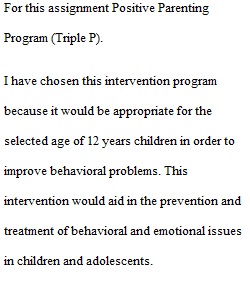


Q Positive Parenting Program (Triple P): The Positive Parenting Program is a multi leveled parent education program. A Triple P trained parent educator works one-on-one with a family on a specific parenting issue or intensive parenting needs. Also available in a group format. Play Therapy: APT defines play therapy as "the systematic use of a theoretical model to establish an interpersonal process wherein trained play therapists use the therapeutic powers of play to help clients prevent or resolve psychosocial difficulties and achieve optimal growth and development."More simply put, child play therapy is a way of being with the child that honors their unique developmental level and looks for ways of helping in the “language” of the child –play.Licensed mental health professionals therapeutically use play to help their clients, most often children ages three to 12 years, to better express themselves and resolve their problems.Play Therapy works best when a safe relationship is created between the therapist and client, one in which the latter may freely and naturally express both what pleases and bothers them.Mental health agencies, schools, hospitals, and private practitioners have utilized Play Therapy as a primary intervention or as supportive therapy for:•Behavioral problems, such as anger management,grief and loss, divorce and abandonment, and crisis and trauma.•Behavioral disorders, such as anxiety, depression, attention deficit hyperactivity (ADHD), autism or pervasive developmental, academic and social developmental, physical and learning disabilities, and conduct disorders. Nurse Family Partnership (NFP): A nurse home visiting program serving low-income, first-time mothers. Visits begin during the first or second trimester of pregnancy and continue until the child's second birthday. Referrals must be received before 28 weeks gestation. Nurse-Family Partnership's outcomes include long-term family improvements in health, education, and economic self-sufficiency. Avance: TheAVANCE Parent-Child Education Program provides weekly three-hour classes to low-income Latino parents who have children under age 3 and includes early education for the children. Classes focus on parent education, early childhood development, literacy, and school readiness and are conducted in Spanish. The program has been proven to significantly improve kindergarten readiness, maternal involvement in children’s education,maternal education, and to reduce reliance on public benefits over time. AVANCE children followed into the K-12 system showed increased attendance, reading and math proficiency, and high school graduation. IDEA Part C -Early Intervention: Early Start: A State of California program implemented through the state regional centers and many agencies and other professionals. A variety of services for children birth–36 months who qualify as having a developmental disability or a developmental delay. For this assignment, students will focus in on how early intervention supports social and emotional development.http://ectacenter.org/partc/partc.asp (Links to an external site.) Child Parent Psychotherapy: CPP is an intervention model for children aged 0-5 who have experienced at least one traumatic event and/or are experiencing mental health, attachment, and/or behavioral problems, including posttraumatic stress disorder. The treatment is based in attachment theory but also integrates psychodynamic, developmental, trauma, social learning, and cognitive behavioral theories. Therapeutic sessions include the child and parent or primary caregiver. The primary goal of CPP is to support and strengthen the relationship between a child and his or her caregiver as a vehicle for restoring the child's cognitive, behavioral, and social functioning. Treatment also focuses on contextual factors that may affect the caregiver-child relationship.https://childtrauma.ucsf.edu/child-parent-psychotherapy-resources Abriendo Puertas: Abriendo Puertas/ Opening Doors is the nation’s first evidence-based comprehensive training program developed by and for Latino parents with children ages 0-5. Parent input informs the Abriendo Puertas / Opening Doors curriculum, which uses the “popular education” approach to engage parents in lessons that reflect the culture of the target audience. The ten interactive sessions draw from real-life experiences, incorporate data about local schools and communities, and focus on helping Latino parents understand their important role in the development of and long-term impact on their children’s educational outcomes. Abriendo Puertas / Opening Doors' train-the–trainer model helps local family service providers improve their outreach and interaction with families, and create asustainable program that reaches beyond the initialtrainingsession (Links to an external site.) Trauma-Focused Cognitive Behavioral Therapy (TF-CBT): is a psychosocial treatment model designed to treat post-traumatic stress and related emotional and behavioral problems in children and adolescents. Initially developed to address the psychological trauma associated with child sexual abuse, the model has been adapted for use with children who have a wide array of traumatic experiences, including domestic violence, traumatic loss, and the often multiple psychological traumas experienced by children prior to foster care placement. The treatment model is designed to be delivered by trained therapists who initially provide parallel individual sessions with children and their parents (or guardians), with conjoint parent-child sessions increasingly incorporated over the course of treatment. Parent Child Interaction Therapy http://www.pcit.org/what-is-pcit.html (Links to an external site.) PCIT is an evidence-based treatment for young children (ages 2-8) with behavioral problems. PCIT is conducted through "coaching" sessions during which you and your child are in a playroom while the therapist is in an observation room watching you interact with your child through a one-way mirror and/or live video feed. You wear a "bug-in-the-ear" device through which the therapist provides in-the-moment coaching on skills you are learning to manage your child's behavior. PreviousNext Please look at the Intervention Assignment for more information - the assignment details, intervention descriptions, etc. For today, you will submit: 1. Intervention 2. Why you are choosing it - 2-3 sentences - it may be based on the age group, population served, professional interest, topic addressed, etc. 3. Preliminary research: This assignment has 3 parts - Detailed description of the Intervention' Analysis of the Intervention; Family Explanation. Include a website or journal article you might use to help you describe the intervention OR in your analysis.
View Related Questions